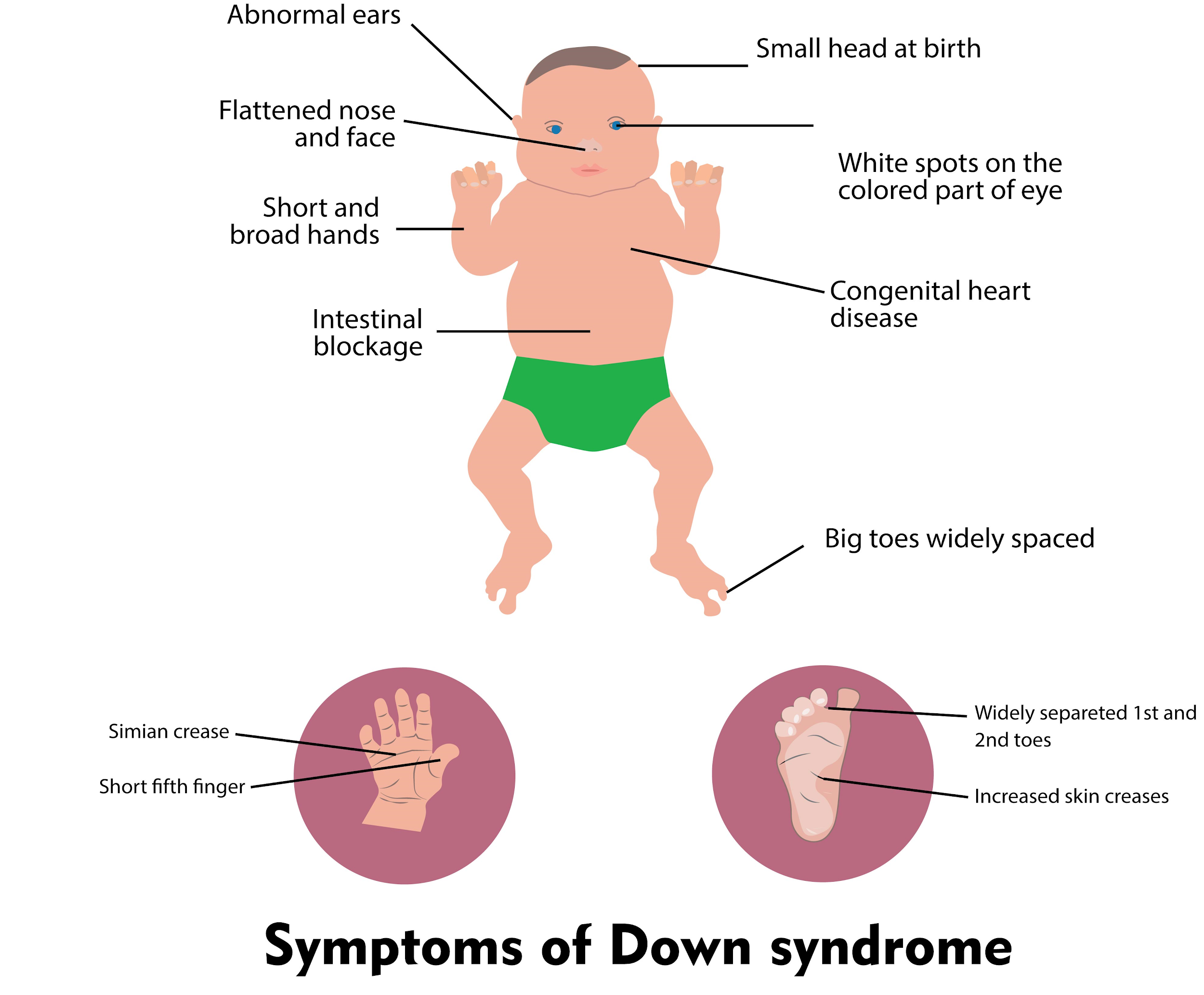
In Down’s syndrome the chromosome number in each cell of the body is
(a)45
(b)47
(c)48
(d)49
Answer
584.4k+ views
Hint: Down’s syndrome is a chromosomal disorder that is related to certain birth defects. Common features of the down syndrome include distinctive facial appearance(tiny ears, short neck, and tongue that tend to stick out of the mouth), hypotonia, and cognitive delays.
Complete answer:
In Down’s syndrome affected individuals usually have three copies of chromosome 21 in every cell, which in total makes up 47 chromosomes per cell. A normal human cell contains 23 pairs of chromosomes in which half are inherited from each parent. Genetic disorders or aberrations which are caused during the time of fertilization can cause birth defects.
Additional Information: -Chromosomal disorders, aberration, or mutations can be formed by a fault in the replication of cells. These damages can induce the production of unwanted proteins or can cause an unbalanced proliferation of cells.
- Down syndrome affected individuals who have a higher chance of congenital heart disorders, respiratory problems, and hearing deficiency, Alzheimer’s disease, blood cancer, and thyroid dysfunctions.
-DNA damage can be divided into two major groups which are endogenous damage and exogenous damage. The endogenous damages are caused by reactive oxygen species or by certain metabolic products, wherein exogenous damage, the damages are caused by external chemical, physical and biological agents.
So, the correct answer is 47.
Note: -Even though the affected individuals have intellectual disabilities, with proper training they can lead a normal life and also, behavioral and mental ability differs from individual to individual.
-Turner syndrome is another genetic disorder, where the individuals are born with a single-sex chromosome. This condition is called monosomy.
-Hereditary mutations are passed on from parents and will be present throughout an individual’s life. Since these mutations are present in the female’s egg or male’s sperm (germ cells) they are also called germline mutations.

Complete answer:
In Down’s syndrome affected individuals usually have three copies of chromosome 21 in every cell, which in total makes up 47 chromosomes per cell. A normal human cell contains 23 pairs of chromosomes in which half are inherited from each parent. Genetic disorders or aberrations which are caused during the time of fertilization can cause birth defects.
Additional Information: -Chromosomal disorders, aberration, or mutations can be formed by a fault in the replication of cells. These damages can induce the production of unwanted proteins or can cause an unbalanced proliferation of cells.
- Down syndrome affected individuals who have a higher chance of congenital heart disorders, respiratory problems, and hearing deficiency, Alzheimer’s disease, blood cancer, and thyroid dysfunctions.
-DNA damage can be divided into two major groups which are endogenous damage and exogenous damage. The endogenous damages are caused by reactive oxygen species or by certain metabolic products, wherein exogenous damage, the damages are caused by external chemical, physical and biological agents.
So, the correct answer is 47.
Note: -Even though the affected individuals have intellectual disabilities, with proper training they can lead a normal life and also, behavioral and mental ability differs from individual to individual.
-Turner syndrome is another genetic disorder, where the individuals are born with a single-sex chromosome. This condition is called monosomy.
-Hereditary mutations are passed on from parents and will be present throughout an individual’s life. Since these mutations are present in the female’s egg or male’s sperm (germ cells) they are also called germline mutations.

Recently Updated Pages
Master Class 11 Computer Science: Engaging Questions & Answers for Success

Master Class 11 Business Studies: Engaging Questions & Answers for Success

Master Class 11 Economics: Engaging Questions & Answers for Success

Master Class 11 English: Engaging Questions & Answers for Success

Master Class 11 Maths: Engaging Questions & Answers for Success

Master Class 11 Biology: Engaging Questions & Answers for Success

Trending doubts
One Metric ton is equal to kg A 10000 B 1000 C 100 class 11 physics CBSE

There are 720 permutations of the digits 1 2 3 4 5 class 11 maths CBSE

Discuss the various forms of bacteria class 11 biology CBSE

Draw a diagram of a plant cell and label at least eight class 11 biology CBSE

State the laws of reflection of light

10 examples of friction in our daily life




